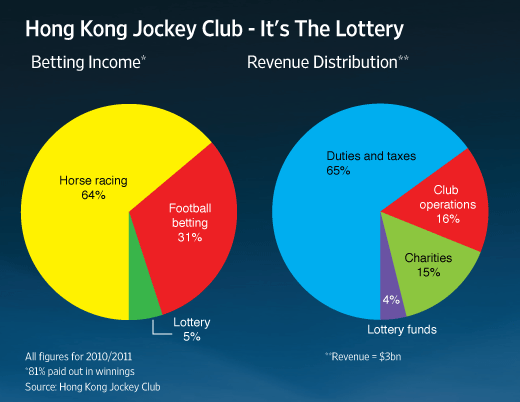HONG KONG (Dow Jones Investment Banker) – The Hong Kong Jockey Club provides sporting entertainment to the public through horse racing, football betting and the Mark Six lottery. It’s also one of the city’s largest taxpayers and a major non-government benefactor, donating more than US$125 million a year to charitable and community projects. With betting revenue fleeing to Macau’s casinos, and no other obvious sources of income on the horizon, a flotation of the lottery – a marginal business for the Club – through a business trust could provide significant additional resources to its operations, and non-profit activities, without materially altering its unusual corporate structure.
The Club is structured as a company limited by guarantee, with no shareholders. Customer bets reached a staggering US$16.5 billion in 2010-2011. Of this, horse racing accounted for more than 64%. Funds remaining after payment of betting dividends, prize money, taxes, operating costs and investments are donated to charitable and community projects. Betting duties and profits tax take away almost two-thirds of the club’s net revenue of about US$3 billion.
Hong Kong Jockey Club has healthy financials. Last year, it generated cash flow of US$537 million from operating activities. It also sits on a net cash pile of more than US$800 million, in addition to a long-term investment portfolio of securities of US$1.7 billion, and a contingency fund worth US$1.6 billion.

Chairman T. Brian Stevenson estimates that Hong Kong lost nearly US$3 billion in betting business to Macau’s casinos in 2010, a figure that has almost trebled in just five years – and now exceeds the Club’s annual income. In his latest financial year-end review, he added that it is now essential to create new sources of revenue, as the Club remains constrained by its regulatory framework, and by a betting tax rate considerably in excess of that in other countries (72.5% to 75.0% on horse racing, as compared to 25% in Australia, 15% in the U.K., or no tax at all in Macau).
Telecoms incumbent PCCW Ltd is finally kicking off its long-awaited business trust IPO in Hong Kong, the first ever in the city, and looks set to raise about US$1.28 billion. At the same time, Spain has finally begun pre-marketing the US$9.45 billion privatization IPO of a 30% stake in State lottery Loterias y Apuestas del Estado, said to offer a dividend yield of at least 8%, and a payout ratio of perhaps up to 95%.
The Club could consider a flotation, through a business trust, of its Mark Six lottery in Hong Kong. This would enable it to realize significant immediate proceeds, while retaining ownership and earning ongoing management fees through a wholly owned trustee-manager. Some US$880 million was spent by Mark Six lottery players in Hong Kong last year, of which about US$476 million was paid in winnings, and US$404 million was ultimately earned as lottery revenue by the Club. Some US$220 million of that revenue was paid to the Government in taxes, with US$131 million set aside for the Lotteries fund (which supports social welfare projects). The Club retained a lottery commission of about US$53 million.
Assuming, for argument’s sake, Loterias’s valuation as base, Mark Six, based on the same multiples of amounts wagered by customers and of lottery revenue – but suitably discounted to reflect its much smaller and less diversified revenue base – could be valued at perhaps up to US$2 billion, resulting in significant IPO proceeds, even if only a minority stake were to be spun off.
PCCW will set the yield benchmark for business trusts in Hong Kong, although Hong Kong dollar- denominated REITs there currently yield around 7.8%, with the higher rated ones in a range of 4.5% to 7.5%. With the strong backing of the Club’s name, a business trust might perhaps be able to price nearer the lower end.
One can expect a thorough steward’s enquiry on the part of the regulator and HKEx for such a scheme, which might prove controversial, particularly since such a household name could attract significant retail interest, including from some of the Club’s 20,000 members.
But it might perhaps be worth the gamble.
(Philippe Espinasse worked as an investment banker in the U.S., Europe and Asia for more than 19 years and now writes and works as an independent consultant in Hong Kong. Visit his website at https://www.ipo-book.com. Readers should be aware that Philippe may own securities related to companies he writes about, may act as a consultant to companies he mentions and may know individuals cited in his articles. To comment on this column, please email [email protected]).
[This article was originally published on Dow Jones Investment Banker on 27 September 2011 and is reproduced with permission. Readers should note that the Loterias IPO in Spain was postponed last week, it is believed largely for political reasons]
Copyright (c) 2011, Dow Jones & Company, Inc.
